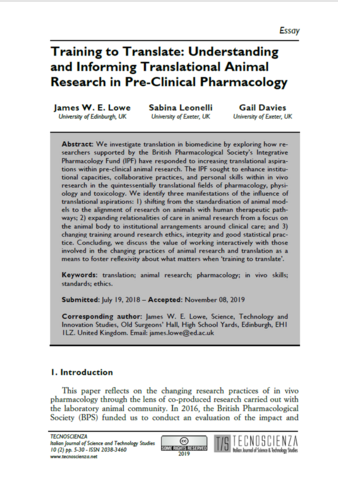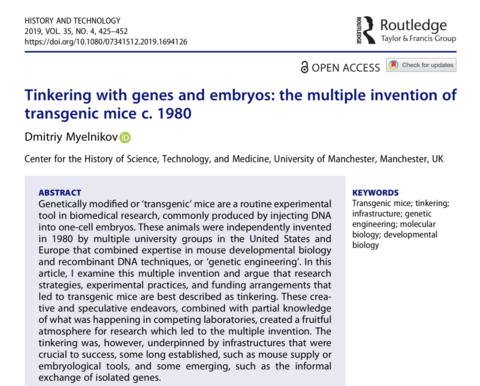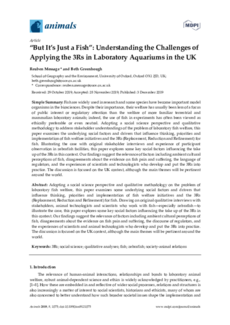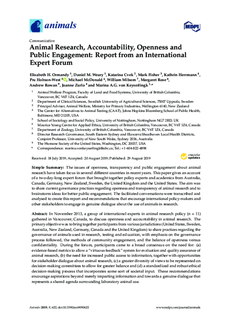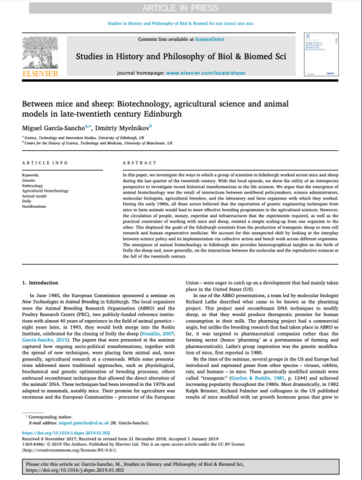Publications: Papers
In this paper, in Tecnoscienza, we investigate translation in biomedicine by exploring how researchers supported by the British Pharmacological Society’s Integrative Pharmacology Fund (IPF) have responded to increasing translational aspirations within pre-clinical animal research.
Genetically modified or ‘transgenic’ mice are a routine experimental tool in biomedical research, commonly produced by injecting DNA into one-cell embryos. These animals were independently invented in 1980 by multiple university groups in the United States and Europe that combined expertise in mouse developmental biology and recombinant DNA techniques, or ‘genetic engineering’. In this article, I examine this multiple invention and argue that research strategies, experimental practices, and funding arrangements that led to transgenic mice are best described as tinkering. These creative and speculative endeavors, combined with partial knowledge of what was happening in competing laboratories, created a fruitful atmosphere for research which led to the multiple invention. The tinkering was, however, underpinned by infrastructures that were crucial to success, some long established, such as mouse supply or embryological tools, and some emerging, such as the informal exchange of isolated genes.
This paper examines some underlying social factors and drivers that influence thinking, priorities and implementation of fish welfare initiatives and the 3Rs (Replacement, Reduction and Refinement) for fish. Drawing on original qualitative interviews with stakeholders, animal technologists and scientists who work with fish—especially zebrafish—to illustrate the case, it explores some key social factors influencing the take up of the 3Rs in this context.
While sociologists of medicine have focused their efforts on understanding human health, illness, and medicine, veterinary medical practice has not yet caught their attention in any sustained way. In this critical review article, we use insights from the sociology of diagnosis literature to explore veterinary practice, and aim to demonstrate the importance of animals to sociological understandings of health, illness and disease. We hope that this work encourages more focus on the veterinary profession, and a better understanding of the role of the vet inside and outside the laboratory.
The issues of openness, transparency and public engagement about animal research have taken focus in several different countries in recent years. This open access paper gives an account of a two-day-long, international expert forum on this topic.
Here, we investigate the ways in which a group of scientists in Edinburgh worked across mice and sheep during the last quarter of the twentieth century. With this local episode, we show the utility of an interspecies perspective to investigate recent historical transformations in the life sciences.
This paper draws on ethnographic work with laboratory animal technologists to offer insights into the skills required to study human–animal relations and the role played by storytelling in negotiating the contested moral economies of animal research.
Vets play an important role in a wide variety of social contexts, including in ‘non-therapeutic’ roles, for example in facilitating the use of animals in sport or for food production. This paper focuses on a further non-therapeutic example, namely the role of the vet in laboratory animal research
This special issue of Science, Technology and Human Values was guest edited by members of the AnNex team. It explores the changing situation of the 3Rs through five papers that explore how the 3Rs principles emerged, chart the ways they are enacted in practice, and reflect on their future challenges.
This Nature correspondence note, written by Gail Davies, explains the principles of the UK’s Animals in Science Committee (ASC) review of the processes of harm–benefit analysis (HBA) carried out under the UK Animals (Scientific Procedures) Act 1986 (ASPA).
